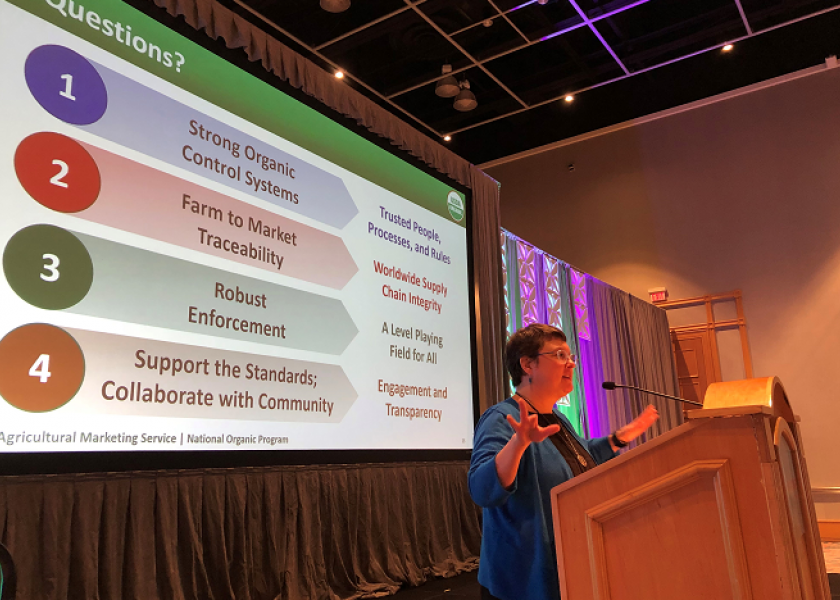Tucker: hydroponic organic certification is settled issue

HOLLYWOOD, Fla. — U.S. Department of Agriculture organic certification of hydroponic operations is a settled issue, according to National Organic Program Deputy Administrator Jennifer Tucker.
Tucker spoke at Feb. 1 at The Packer’s 2019 Global Organic Produce Expo, on the topic of “Issues and Trends in Enforcement of Organic Regulations.”
“Last year we issued an Organic Insider (e-mail newsletter) that indicated that hydroponics had been allowed since the beginning of the program and that (they) are still allowed,” Tucker said in response to a question from the audience. “We consider that a settled issue.”
Responding to a question of why some certifiers can certify hydroponic operations and some do not, Tucker noted that certifiers evaluate the growing practices of an operation based on the organic regulations and how they apply to site-specific production conditions.
Some certifiers don’t have the administrative capacity or technical expertise to certify hydroponic systems, she said, so those operations may need to call several to determine if they have that ability.
“There are some certifiers that certify hydroponics, and there are some that do not; they are all bound by a common set of regulations.”
In November 2017, by a vote of 8 to 7, the National Organic Standards Board voted to reject proposals to make hydroponic and aquaponic production methods prohibited under the NOP.
In January, the Center for Food Safety filed a legal action demanding that the USDA prohibit hydroponic operations from using the organic label, a move that was endorsed by the Organic Farmers Association, Northwest Organic Dairy Producers Alliance, The Cornucopia Institute and other groups.
NOP Priorities
Tucker described how the NOP will soon begin putting in place new provisions from the farm bill related to oversight, enforcement, data reporting, and technology.
“Our next step is to integrate those provisions into USDA organic regulations,” she said.
Tucker said a new proposed rule, termed “Strengthening Organic Enforcement” is expected to come out sometime this year and then be open for public comment. Provisions regarding audits of certifiers and risk-based oversight models will be included in the proposed rule.
The NOP also is making farm-to-market traceability for the global organic supply chain a priority.
“There is a lot of talk about blockchain in the agriculture community and that could potentially enable exchange of data over networks,” she said.
Another key priority is enforcement to create a level playing field for all, she said.
Two key areas for enforcement include import oversight and dairy compliance.
“We’ve advanced a number of enforcement projects in these areas and we’ve seen a number of successes in terms of removing bad actors from the market,” she said.
Tucker invited people interested in serving on the National Organic Standards Board to look for a call for nominations this spring.
Tucker responded to a question about pesticide residue testing for organic produce, and whether the U.S. would copy stepped-up testing used in Europe.
Tucker said that certifiers are now required to do residue testing for at least 5% of their operations each year.
Certifiers use residue testing as part of their risk-based oversight programs, she said.
The NOP has introduced additional residue testing requirements for some imports, she said, but changing residue testing requirements overall would require a regulatory change. As of now, that’s not on the agenda, she said.
“We are talking with certifiers about how to use residue testing strategically as part of a risk-based oversight model and we are using directives with certifiers where we see particular challenge areas in order to reemphasize the importance of that.
Responding to a question on the effect of Brexit on exports of organic products to England, Tucker said U.S. NOP officials have been looking at whether there could be an equivalency arrangement put in place if England would withdraw from the European Union.
“I think there is a tremendous awareness of the need not to disrupt trade,” she said. “We are in very close communication with the U.S. Trade Representative and there is a lot of interest in making sure that trade is not disrupted.”







